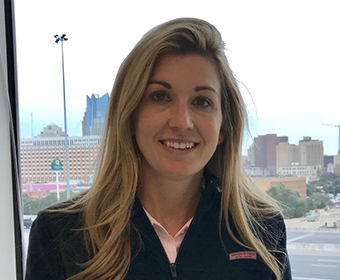Posted on March 3, 2019 by Michelle Skidmore

Augustyn’s research includes social, emotional, and justice based support after victimization, particularly in light of the #MeToo movement.
(March 4, 2019) — Megan Augustyn is an assistant professor in the UTSA College of Public Policy's Department of Criminal Justice, where she conducts research on the causes and consequences of crime and victimization, help-seeking behaviors, intimate and family violence, and gender and crime. Within the scope of victimization, she is exploring a wide range of topics including the access of resources by victims of crime as well as the social, educational, and economic costs of victimization.
Augustyn earned her bachelor's degree in Sociology and Spanish from the University of Notre Dame and her master's and Ph.D. degrees in Criminology and Criminal Justice from the University of Maryland. At the latter, she studied the role of procedural justice on recidivism. Her recent work has been published by Criminology, the Journal of Research in Crime and Delinquency, the Journal of Adolescence, and the Journal of Adolescent Health.
In light of national news headlines about trends in victimization, we asked Professor Augustyn to share more about her work.
What kind of research projects do you have underway these days?
My research agenda is pretty diverse regarding the causes and consequences of offending and victimization across the life course, but right now I am particularly interested in the acquisition of social, emotional and justice based support after victimization, including whether or not victims report, particularly in light of the #MeToo movement. I am also interested in the educational and economic costs of victimization and I am currently working with some UTSA colleagues to look at the consequences of victimization among college students. We are particularly interested in understanding how victimization may affect student performance and success.
Additionally, I am partnering with Family Service of San Antonio to evaluate Promotoras, a community health worker program that seeks to reduce the prevalence and incidence of child maltreatment in District 5 of San Antonio, which has the highest maltreatment rates in the city. The program involves training community health workers and pairing them up with at risk families to provide family based services and support to reduce future maltreatment.
What drew you to UTSA?
I was drawn to UTSA because of the excellence of the faculty in the Department of Criminal Justice and the College of Public Policy. Faculty share a similar mindset of wanting to do the best work and improve lives. I hope to add to these efforts.
Is there anything going on in your field that others aren't talking about?
One topic that I think deserves more attention is the study of victimization at Hispanic Serving and non-traditional colleges. These programs focus considerably on retention and graduation rates but often fail to realize that a student's entire experience is related to success. Fortunately, I am able to work with a great group of researchers at UTSA to better understand student victimization experiences both on and offline.
How will the findings of your research be used?
I hope that policy makers will look more toward research that is being conducted and the validity of this research to make decisions. I often try to teach my students that feelings or opinions are not enough to make decisions. If evidence is available to inform decisions, it should be used. If it is not available, then it should be collected so as to make informed decisions.
What other advice do you pass along to your students?
I tell my current students to have an open mind and an open-heart. Tradition and opinions, regarding any topic, are deeply rooted in upbringing. One of the benefits of attending college is to broaden one's knowledge base and worldview. Even if a student's opinions do not change or are reaffirmed, being exposed to knowledge will make one keener and a more valuable asset in any industry.
Also, ask questions! I encourage students to do their own research: to investigate, experiment, understand. These are the skills that will make one more successful in life and, hopefully, I have been able to foster the desire to do these tasks among my students.

